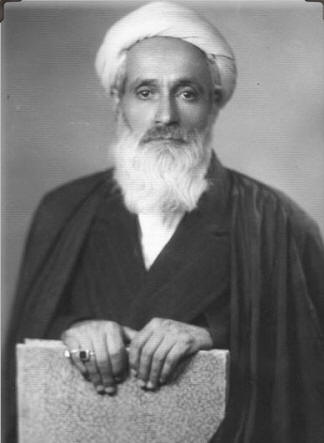Chacham Yousef Haim Or-Sharga

Yousef Haim Or-Sharga was born on the Yom Kippur of 1898 C.E., 1277 of the Persian Calendar, henceforth P.C., to a religious Jewish family of Yazd, Iran. According to the available facts and the greater Or-Sharga family-tree, Chacham Yousef Or-Sharga’s paternal ancestors were among the best-known religious sages of Yazd around two and a half century ago, who upon arriving in the city had undertaken the religious guidance and leadership of its Jewish community. Yousef Or-Sharga, a fifth generation descendant of the famous Mullah Or Sharga, was five when he began his studies at the schools of his father Chacham Or, his grandfather Mullah Moshe “Moses” a.k.a. Mullah Agha-Baba., and his uncle Chacham Raphael, all of whom were among the religious sages of Yazd. Starting with the Hebrew language and the basics of the Jewish religion, the little Yousef soon went on to master such advanced religious subjects as the Tanach a.k.a. The Jewish Bible, as well as the Mishnah and Gemara. Before long, he was licensed as a shochet, permitted to treat both birds and larger animals according to the laws of kashrut.
As a young man, along his cultural activities, Chacham Yousef Or-Sharga founded the first modern school in Yazd, which was directed by Shemouel “Samuel” Aba-Eliah. Next, he gave new life to the Midrash i.e. Seminary of Yazd, originally established by his paternal ancestor, as a Yeshiva or Jewish Theological Seminary. Thus, after 180 years, he made Yazd widely known again as a prominent Jewish religious center.
At 23, after a short stay in Tehran, Chacham Yousef Or-Sharga left the country for Baghdad and then Jerusalem to receive advanced education in the religious sciences. For seven years, he stayed in the most important Midrashim or “Jewish Seminaries” of the Holy Land, until he successfully graduated in the religious subjects at the schools of the greatest clerical sages and teachers of the time. Not only he received the Rabbinical Diploma, the highest degree offered in the religious sciences, but also he earned the authority to issue religious arbitration verdicts, besides that he earned the Certificate of Shechita in both the Sephardic and the Ashkenazi Beith-Dins. Finally, in 1928 C.E., 1307 P.C., he returned to his birthplace of Yazd with the hard-earned title of Rabbi.
Once more, to underscore some of his particular achievements, Chacham Yousef Or-Sharga earned the religious license for the kosher treatment of the animals, as well as the Rabbinical Diploma, from both the Sephardic and the Ashkenazi Beith-Dins. He was one of the first Iranian figures to be honored by a Diploma in Jewish Religious Sciences and Theology, and to earn the clerical rank to issue arbitration verdicts, from the greatest religious authorities and sages of Jerusalem. Consequently, before long, he was employed by the Alliance Israélite Universelle to teach Hebrew and the religious subjects at the Ettehad “Alliance” School of Yazd. For years afterwards, Chacham Yousef led and served the religious affairs of the Jewish community of Yazd and its surrounding cities, besides that he personally directed the Midrash “Seminary” of the city. He trained many youngsters to carry out the shechita of the kosher birds and larger animals, and he personally licensed them to practice the task.
In the mid-1940’s C.E., 1320’s P.C., even as Morad Arieh served as both the Jewish Representative in the National Parliament and the Chair of the Tehran Jewish Association, Chacham Yousef Or-Sharga moved to Tehran by the request of the Jewish Association and a number of community philanthropists, and thus, he began immediately to serve the community in the religious affairs. Among his services, he performed the brith milah i.e. the “ritual circumcision”, as well as the ketubah i.e. the “marriage contract”. Furthermore, with his brother’s cooperation, Chacham Mashallah, he undertook the task of shechita at the great meat preparation facility of Tehran. In 1946 C.E., 1325 P.C., he opened the Notary Office No. 38 of Marriage and Divorce, which he would direct personally for years. Besides his many social and religious activities, he continued to teach the shechita to those interested in this skill in Tehran. Also, as a member of the Yazd Jewish Association, he continued to cooperate with that cultural institution. In that regard, the Jewish Association further invited him to collaborate in forming the Beth-Din i.e. the “Jewish Court of Arbitration” of Tehran.
Chacham Yousef Or-Sharga was a prominent member of the Beith-Din and one of the highest-ranking religious leaders of the Jews of Iran. In collaboration with Chacham Yedidia Shofet and Chacham Ouriel Davidi, he went on for years to serve his fellow Jews, sincerely, meritoriously, and with the salient attributes of a religious leader, such as his modesty, and thus he continued to express his religion to the society.
Chacham Yousef Or-Sharga was one of rarest religious figure of his time. He had a mastery of the Kabbalah, and he spent most of his spare time studying such religious texts as the Tanach and Talmud. He was known to everyone for his love of reading. Furthermore, as a spiritual figure, especially among the erudite individuals and cultural institutions of the Jewish community, he had a significant and constructive role in advancing the Jewish culture and spreading the laws of the Torah throughout the many sectors of the society. Among his many services, as a member of the Beith-Din, he offered answers to the religious questions put forth by the community, as well as by the Iranian Judiciary Courts at large. He also founded and ran a temple known as the Mullah Yousef Synagogue.
As a most salient characteristic of this spiritual figure, he paid particular attention to the affairs of the impoverished people and helped in providing for their living expenses. He considered it his religious duty to attend to and assist the poorer families so far as he could, and to the end of his life, he maintained this crucial task atop his religious services. According to his inner circle, Chacham Yousef could have amassed a fortune from his several professional resources, yet he often carried out such services for free.
Not only he forwent his fees, but also he spent most of his earnings in philanthropic causes and to help the poor, so far as on occasion, he and his family found themselves in financial hardship. Yet, he would not alter his humanitarian way of life. During his last years, bedridden by illness, he lived on a small salary that he received from the Meat Organization of Iran. Sadly, to some extent, he was also ignored or ill-treated by some of the community’s political figures. Upon death, he left behind not a penny in riches.
In 1911 C.E., 1298 P.C., Chacham Yousef Or-Sharga married his future wife Sarah Khak-shouri in the city of Yazd. The couple brought three sons and three daughters to the world.
In 1979 C.E., 1358 P.C., Dr. Mousa “Moses” Azadegan, Chacham Or-Sharga’s third son, was elected to the Tehran Jewish Association as the Chair of the Board of Directors, a position which he went on to serve until 1983 C.E., 1362 P.C.
In 1974 C.E., 1353 P.C., Chacham Yousef Haim Or-Sharga suffered a stroke, and consequently, he became bedridden and unable to speak. Three years into his illness, in the winter of 1978 C.E., the month of Bahman of 1356 P.C., the 23rd of Shevat, 5738 of the Hebrew Calendar, this eminent spiritual figure passed away at the age of 80, leaving behind the transient world to join his ancestors in the eternity. May he rest in peace.
Related Links:


 فارسی
فارسی